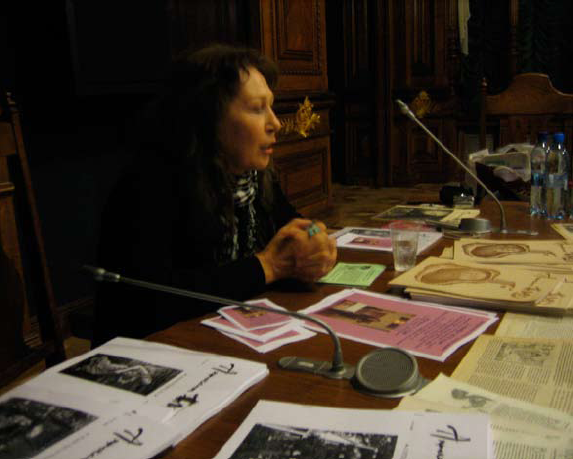15 Years of Blues Civilization. Questions and Opinions (Responses from the Editor-in-Chief)
Published in: 19. The School of Anonymity
Tatyana Apraksina at an Apraksin Blues 15th anniversary meeting in St. Petersburg, 2010
- Exchanging views through your “Mail” section and beyond it is a part of the large and at first glance unnoticed work performed by the magazine daily, creating a unique camaraderie among authors and readers as a kind of idea-based community. The motto of this Order of intellectuals and romantic scholars could be “I come with fire but not to burn” (like the Easter fire). That’s how I see the mission of AB.
○ In fact, our writers often feel they’ve found a circle not simply of attractive and interesting people, but of like-minded people who understand each other well — despite obvious differences: in genre, in profession. Despite each person speaking from an individual standpoint. Perhaps this very fact provides the greatest unity: no one’s presenting anyone’s views but their own. And everyone has a trait in common: a wish to speak about what they themselves consider most important.
- The magazine includes very serious, complex subjects, in-depth articles, clearly addressed to an intellectual elite. Do you think about ordinary, untrained readers?
○ We have the greatest respect for all readers, never allowing ourselves to look down on them, and so we don’t separate them — the same holds true for authors, by the way — into categories of special and ordinary. I can’t view any reader as somehow lower than myself. And I find that the best way to show consideration for ordinary readers is to give them the opportunity of naturally overcoming the limits of ordinariness, to switch seamlessly to less ordinary mental operations. Publications focused on homespun simplicity don’t give anyone that opportunity.
Besides that, so many people worry about the uncomplicated interests of the mass public, and I’d like to make sure that the more seasoned intellectual elite can read what it deserves.
Readers of “Apraksin Blues” range from schoolchildren to academics. And in most cases each issue is read “from cover to cover.”
- The magazine conveys a sense of relaxedness, inspiration, spontaneity. Do the authors really understand each other so well that everything comes together on its own, without needing the kind of work that other magazines require?
○ The impression of spontaneity results from careful selection and a great amount of thorough work, which leads to the organic outcome. The magazine contains no random content, no filler, just as the human body contains no random organs, just as a musical composition contains no random notes.
We expect authors promoting their own worldview to feel total trust — first in themselves, and then in their readers — while readers’ trust absolutely must prove justified; they need to be sure no one’s manipulating them.

Speak Your Mind